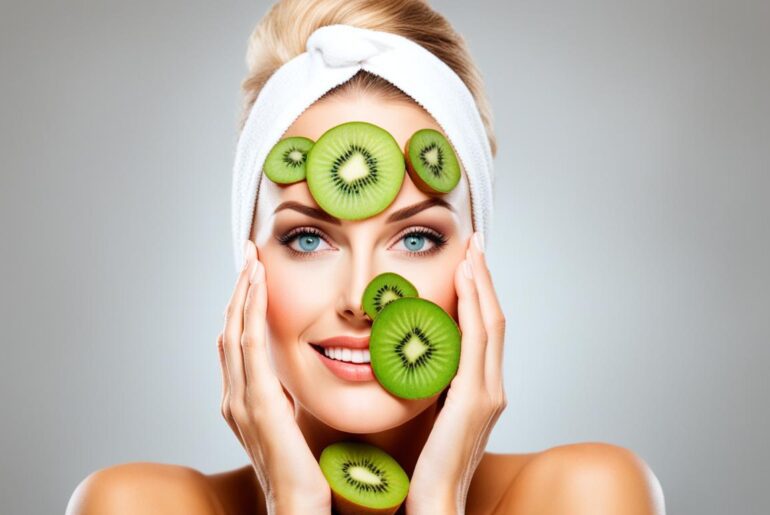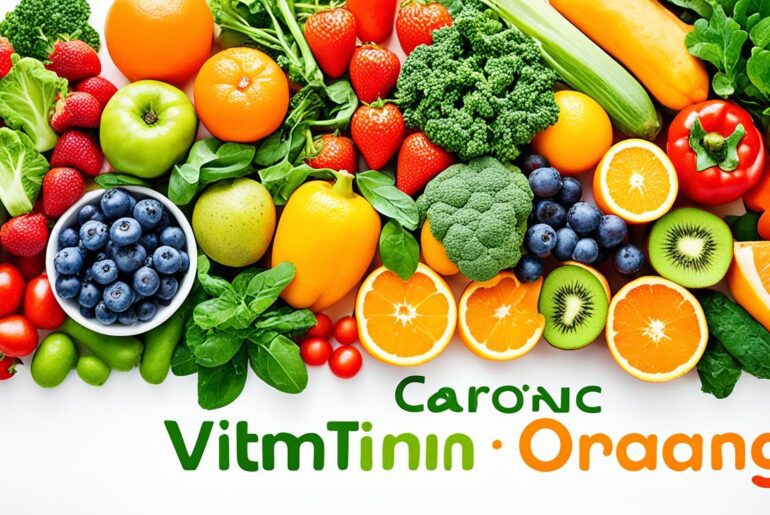When it comes to achieving healthy, glowing skin, it’s not just about the creams and serums you use. The secret to a truly radiant complexion lies within the vitamins you incorporate into your skincare routine. But, which vitamins are the best for promoting skin health?
From repairing damaged skin to rejuvenating tired-looking complexion, the right vitamins can work wonders for your skin. In this article, I will uncover the key vitamins that can boost your skin’s health and help you achieve the clear, glowing skin you’ve always wanted. Prepare to be amazed at the transformative power of these essential nutrients!
Key Takeaways:
- Incorporating the right vitamins into your skincare routine is crucial for promoting skin health.
- Essential vitamins such as Vitamin B3, Vitamin A, Vitamin C, Vitamin E, and Vitamin D play a significant role in enhancing skin health and addressing various skin concerns.
- Each vitamin offers unique benefits, such as reducing the risk of skin cancers, combating acne and signs of aging, protecting against free radical damage, and promoting skin repair and rejuvenation.
- While vitamins are an essential part of skincare, it’s important to consult with a dermatologist to determine the best approach for your specific needs.
- Remember, a holistic approach to skincare, including a healthy diet, sun protection, hydration, and stress management, is key to achieving optimal skin health.
The Importance of Vitamin B3 (Nicotinamide)
One essential vitamin for skin health is Vitamin B3, specifically in the form of nicotinamide. Studies have shown that orally taking nicotinamide at a dosage of 500mg twice a day can decrease the rate of skin cancers by 20-30% and pre-cancerous lesions by 15%. This vitamin is particularly beneficial for individuals who have had previous skin cancer or are at higher risk due to certain factors. The best part is that there are no side effects associated with taking nicotinamide.
Vitamin B3, also known as nicotinamide, is crucial for maintaining healthy skin. It has been proven to have significant benefits in reducing the risk of skin cancers and pre-cancerous lesions. Research has shown that oral supplementation of nicotinamide at a specific dosage can effectively decrease the occurrence of skin cancers by up to 30% and pre-cancerous lesions by 15%. This makes it an excellent choice for individuals who have a history of skin cancer or are at higher risk due to various factors.
The skin is the largest organ in the human body and is susceptible to damage from various external factors, such as UV radiation and oxidative stress. Vitamin B3, or nicotinamide, acts as a potent antioxidant and plays a vital role in repairing DNA damage caused by these external factors. By reducing cellular damage and inflammation, nicotinamide helps prevent the onset of skin cancers and pre-cancerous lesions.
In addition to its protective effects, nicotinamide also improves skin barrier function, enhances skin hydration, and reduces fine lines and wrinkles. It has been shown to increase the production of ceramides, a crucial component of the skin’s protective barrier, leading to improved barrier function and hydration. This, in turn, helps reduce water loss, keeping the skin moisturized and plump.
Furthermore, nicotinamide has anti-inflammatory properties that can help calm redness and irritation, making it beneficial for individuals with sensitive or acne-prone skin. It also aids in regulating sebum production, helping to control excess oil and prevent clogged pores.
Overall, the oral supplementation of Vitamin B3 in the form of nicotinamide is a safe and effective way to promote skin health and reduce the risk of skin cancers and pre-cancerous lesions. It is recommended to consult a dermatologist for personalized advice on the appropriate dosage and duration of supplementation.
Understanding Vitamin A, Retinol, and Retinoids
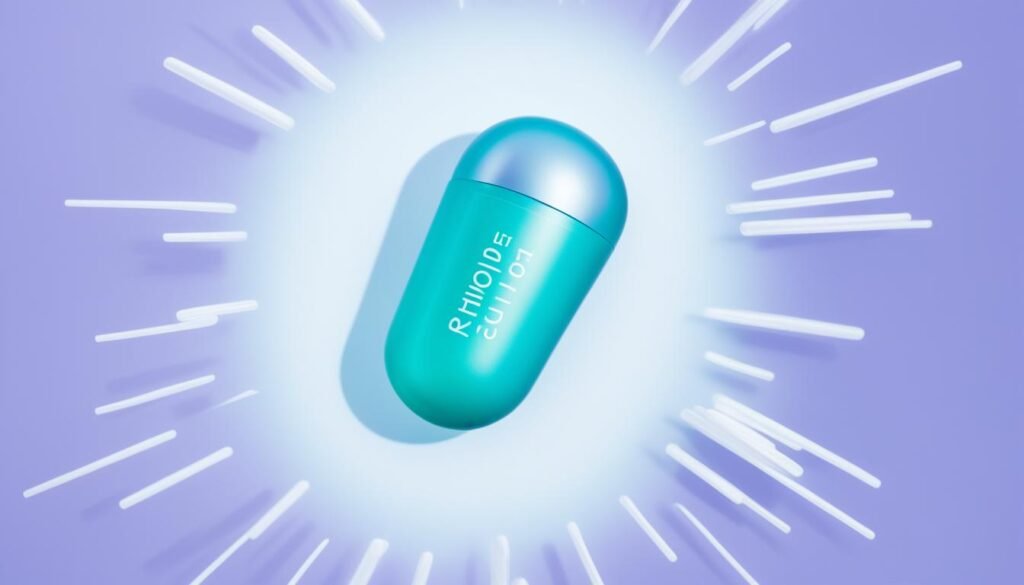
Vitamin A, also known as retinol, plays a crucial role in maintaining healthy skin. It comes in various forms, including retinol and retinoids, which have become popular ingredients in skincare products. These compounds are known for their ability to address a wide range of skin concerns, from acne to fine lines and wrinkles, pigmentation issues, and texture abnormalities.
Retinol, which is available in over-the-counter products, is a milder form of Vitamin A compared to prescription-strength retinoids. It is a great starting point for those new to Vitamin A skincare. Individuals with sensitive skin may benefit from beginning with retinol and gradually increasing usage to minimize any potential irritation.
Prescription-strength retinoids, on the other hand, are more potent and tend to be more effective for treating acne. Dermatologists often recommend these for individuals with severe acne or those who have not seen improvement with over-the-counter products. However, it is essential to carefully follow the instructions provided by your dermatologist when using prescription-strength retinoids.
Both retinol and retinoids work by increasing cell turnover and stimulating collagen production, resulting in smoother, clearer skin with improved texture and tone. However, it is important to note that the effects of Vitamin A on the skin may take at least two months to become noticeable.
When incorporating retinol or retinoids into your skincare routine, it is crucial to use sunscreen daily as they can increase skin sensitivity to the sun. By protecting your skin from harmful UV rays, you can ensure optimal results and prevent any potential damage.
Using Vitamin A, whether in the form of retinol or retinoids, can significantly improve various skin concerns, including acne, fine lines, wrinkles, pigmentation, and texture abnormalities. However, it is advisable to consult a dermatologist before starting any new skincare regimen to determine the most suitable option for your specific needs and to ensure optimal results.
The Power of Vitamin C
Vitamin C, or L-ascorbic acid, is a powerful antioxidant that provides multiple benefits to the skin. It helps prevent damage from free radicals, which are often caused by factors like pollution and sun damage.
This essential vitamin is a vital building block for collagen, a protein that helps maintain the skin’s structure and elasticity. By supporting collagen production, vitamin C can contribute to a smoother and more youthful complexion.
One of the key advantages of vitamin C is its ability to combat hyperpigmentation, including the formation of brown spots. Melanin, the pigment responsible for the coloration of our skin, is produced by cells called melanocytes. Vitamin C helps suppress melanin production, reducing the appearance of brown spots and promoting a more even skin tone.
When it comes to skincare products, the optimal concentration of vitamin C is typically between 10-20%. Higher concentrations do not necessarily provide additional benefits and may even cause skin irritation. It’s important to choose products with the right concentration of vitamin C to maximize its effects and minimize the risk of adverse reactions.
When incorporating vitamin C into your skincare routine, it’s essential to complement it with daily sunscreen use. Vitamin C can enhance the effectiveness of sunscreens and provide additional protection against UV damage.
To visualize the benefits of vitamin C, refer to the table below:
| Benefits of Vitamin C | Description |
|---|---|
| Powerful Antioxidant | Helps prevent damage from free radicals |
| Collagen Production | Aids in maintaining skin structure and elasticity |
| Brown Spot Reduction | Suppresses melanin production, fading brown spots |
| Sunscreen Booster | Enhances the efficacy of sunscreens |
Overall, incorporating vitamin C into your skincare routine can contribute to healthier and more radiant skin. Its antioxidant properties, collagen-boosting effects, and ability to fade brown spots make it a valuable addition to any skincare regimen.
Remember to consult with a dermatologist or skincare professional to determine the best approach for your specific needs and to ensure proper usage of vitamin C products.
Exploring Vitamin E
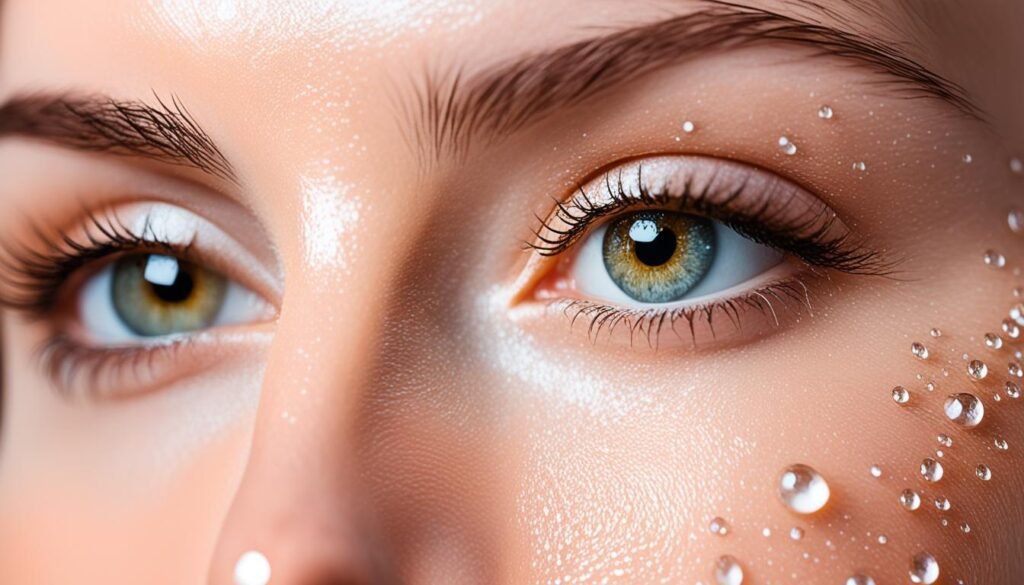
Vitamin E is a fat-soluble vitamin that plays a crucial role in maintaining skin health. As an antioxidant, it helps protect the skin from damage caused by free radicals, which are unstable molecules that can harm cells and contribute to aging and various diseases. Additionally, Vitamin E has anti-inflammatory properties, which can help calm irritated or inflamed skin.
In the context of skincare, Vitamin E is naturally present in the sebum, the oily substance produced by the skin, making it more abundant in individuals with naturally oily skin. However, for those with oily skin, incorporating topical products containing Vitamin E may exacerbate the condition and lead to clogged pores or breakouts.
As we age, both the production of sebum and the levels of Vitamin E in the skin tend to decline. This decline can impact the skin’s ability to retain moisture and protect against environmental damage. Therefore, it becomes essential to replenish Vitamin E through various means.
One way to obtain Vitamin E is through dietary sources. Foods such as sunflower seeds, nuts (such as almonds and hazelnuts), avocado, and fish (such as salmon and trout) are rich in Vitamin E and can be incorporated into a healthy diet to support skin health. However, it’s important to note that the efficacy of dietary Vitamin E in directly improving skin conditions is still a subject of ongoing research.
In cases where adequate Vitamin E intake through diet alone is insufficient, oral supplements may be considered. These supplements are available in various forms, including capsules, tablets, and oils, and can help ensure adequate levels of Vitamin E in the body.
In the realm of skincare, Vitamin E is commonly found in moisturizers, serums, and other topical products. It can enhance the efficacy of these products by improving the skin’s ability to retain moisture and reducing water loss, thereby promoting hydration and nourishment.
Vitamin E is also known for its beneficial effects on scars and stretch marks. Applying Vitamin E topically to these areas can help improve their appearance, although results may vary. It’s important to note that Vitamin E alone may not completely eliminate scars or stretch marks, but it can contribute to their improvement over time.
| Benefits of Vitamin E for Skin | How to Incorporate Vitamin E |
|---|---|
|
|
The Impact of Vitamin D on Skin Health
Vitamin D plays a crucial role in maintaining overall health, and its impact on skin health should not be underestimated. While sunlight exposure is a natural source of vitamin D, it is essential to limit sun exposure to prevent UV damage and rely on other means to obtain sufficient amounts of this vital nutrient.+
The recommended daily intake of vitamin D varies by age group, with doses ranging from 400 IU to 800 IU. It is important to ensure you are meeting your daily vitamin D requirements through various sources, including diet and supplementation, to support optimal skin health.
When sunlight exposure is limited or inadequate, dietary sources become crucial for obtaining vitamin D. Foods such as fortified milk, fatty fish (like salmon and mackerel), and egg yolks are excellent sources of vitamin D. Additionally, incorporating vitamin D-rich supplements can help bridge the gap between dietary intake and recommended levels.
In cases of sunburn or skin damage, high-dose vitamin D3 supplementation has shown promising results in alleviating inflammation and aiding in skin repair. This can be especially beneficial for individuals seeking quick recovery from the harmful effects of UV damage.
It’s important to note that maintaining adequate vitamin D levels is not only vital for skin health but also crucial for overall well-being. Adequate vitamin D levels can support immune function, bone health, and even mental health.
| Source | Vitamin D content (IU per serving) |
|---|---|
| Fortified Milk (1 cup) | 100 IU |
| Salmon (3 ounces) | 447 IU |
| Mackerel (3 ounces) | 205 IU |
| Egg Yolk (1 large egg) | 44 IU |
The importance of vitamin D in skin health cannot be emphasized enough. Whether through sunlight, diet, or supplementation, maintaining adequate levels of this essential vitamin is crucial for supporting skin repair and overall well-being.
The Role of Vitamins in Hair and Nail Health

When it comes to hair and nail health, vitamins play a crucial role in supporting their growth and strength. While there is limited evidence directly linking low levels of vitamin D and iron to hair loss, it is important to maintain a balanced diet to ensure optimal hair and nail health.
Vitamin D: While vitamin D deficiency has been associated with certain hair loss conditions, such as alopecia areata, the research is inconclusive. However, maintaining adequate vitamin D levels through sunlight exposure, diet, or supplements is essential for overall health.
Iron: Iron deficiency has been linked to hair loss. Red meat, poultry, fish, and leafy greens like spinach are good dietary sources of iron. If you suspect iron deficiency, consulting with a healthcare professional for proper diagnosis and guidance is recommended.
Biotin: Biotin is often marketed as a supplement for hair, skin, and nail health. While it is involved in the production of keratin, a protein that makes up hair and nails, there is limited scientific evidence supporting biotin’s effectiveness unless a true biotin deficiency is present. It is advisable to consult with a dermatologist before starting biotin supplementation.
Nutrafol®: One notable supplement for promoting hair and nail growth is Nutrafol®, a clinically tested nutraceutical that contains ingredients like saw palmetto and Sensoril® Ashwagandha to balance hormone levels and support healthy hair growth. Nutrafol® provides a comprehensive approach to hair health and is suitable for both men and women.
Incorporating a balanced diet with adequate nutrient intake is key to maintaining healthy hair and nails. However, individual circumstances may vary, and it is always best to consult with a dermatologist or healthcare professional to determine the need for supplementation and tailored recommendations for hair and nail health.
Other Factors for Overall Skin Health
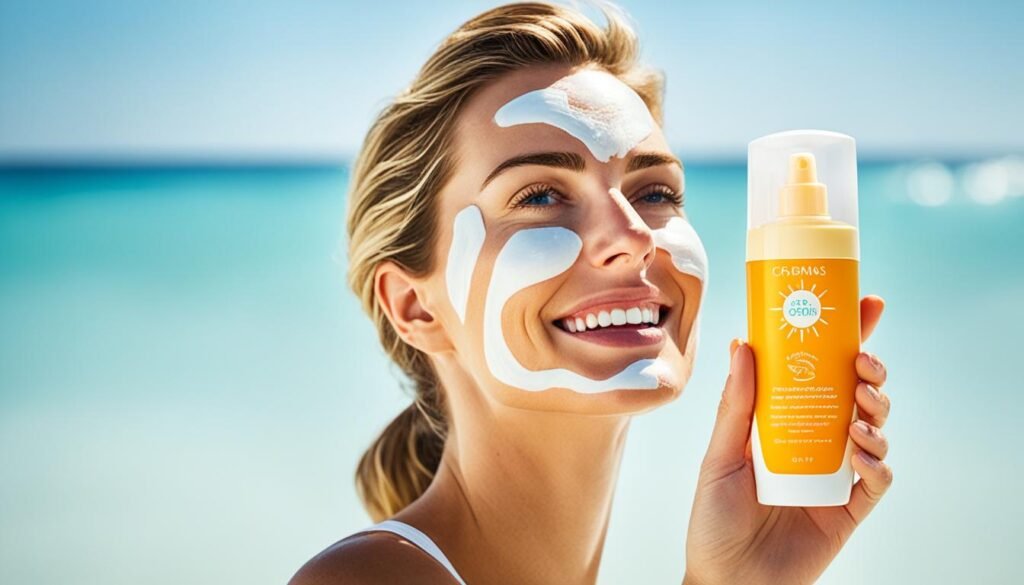
Beyond the essential vitamins, there are several other factors that play a significant role in maintaining healthy and radiant skin. These factors include:
- Sunscreen: Protecting your skin from harmful UV rays is crucial for preventing sun damage, premature aging, and skin cancer. Apply a broad-spectrum sunscreen with an SPF of 30 or higher daily, even on cloudy days.
- Healthy Diet: Evidence suggests that certain foods can worsen acne and inflammation, while others promote skin health. Incorporate a balanced diet rich in fruits, vegetables, lean proteins, and whole grains to nourish your skin from within.
- Water Intake: Proper hydration is essential for maintaining skin health and preventing dryness and dullness. Drink an adequate amount of water daily to keep your skin hydrated and supple.
- Stress Management: Minimizing stress levels is crucial for overall skin health. Stress can exacerbate certain skin conditions, such as acne and eczema, and may even lead to hair loss. Practice stress management techniques such as meditation, exercise, and engaging in activities you enjoy.
Remember, achieving optimal skin health requires a holistic approach. By incorporating sunscreen into your skincare routine, maintaining a healthy diet, staying hydrated, and managing stress levels, you can support your skin’s natural beauty and radiance.
The Role of Nutrition in Skin Health

Nutrition plays a vital role in maintaining healthy skin. By incorporating a balanced diet rich in essential nutrients, you can support the overall health and appearance of your skin. Focusing on skin nutrition involves consuming a variety of fruits, vegetables, fatty fish, leafy dark greens, flaxseeds, legumes, avocados, and olive oil.
One of the key elements of a skin-nourishing diet is incorporating ample amounts of fruits and vegetables. These natural sources are packed with vitamins, antioxidants, and minerals that are beneficial for the skin. Dark leafy greens, such as spinach and kale, are particularly beneficial due to their high levels of vitamins A, C, and E, as well as other antioxidants that help combat free radicals and promote skin health.
Fatty fish, such as salmon, mackerel, and sardines, are rich sources of omega-3 fatty acids. These healthy fats are essential for maintaining skin health and repairing damaged skin cells. Alongside fatty fish, incorporating plant-based sources of omega-3s like flaxseeds can provide similar benefits to the skin.
Legumes, such as lentils and chickpeas, are excellent sources of protein, which is crucial for skin repair and rejuvenation. Protein supports the production of collagen and elastin, two proteins that help maintain the skin’s firmness and elasticity.
Avocados and extra virgin olive oil are excellent sources of healthy fats that nourish the skin. They contain vitamin E, which acts as an antioxidant, protecting the skin from damage caused by free radicals. These healthy fats also help keep the skin hydrated and promote a youthful appearance.
Incorporating these skin-nutritious foods into your diet can provide a wide range of benefits for your skin, including improved elasticity, radiance, and overall health. Remember to consult with a healthcare professional or registered dietitian to ensure your diet meets your specific nutritional needs and supports your skin goals.
Conclusion

Incorporating the right vitamins into your skincare routine is crucial for promoting skin health. Vitamins provide numerous benefits to the skin, but it is important to note that they should not replace medical treatments for skin conditions. For personalized advice and guidance, consulting with a dermatologist is highly recommended. A dermatologist can address specific concerns and determine the best course of treatment for your unique needs.
In addition to incorporating vitamins, maintaining overall health is vital for supporting skin health. This includes adopting a balanced diet, practicing sun protection, staying hydrated, and managing stress levels. These internal and external factors work together to enhance skin health and promote a healthy and radiant complexion.
Remember, a skincare routine is not one-size-fits-all. It is essential to tailor your routine based on your individual needs and consult with a dermatologist to ensure the best results. By prioritizing skin health and seeking professional guidance, you can achieve your skincare goals and maintain overall skin health.
For more information on vitamins for skin health, creating a skincare routine, and maintaining overall health, consult with a dermatologist. They can provide personalized recommendations and guide you towards achieving the best results for your skin.
| Vitamins | Skincare Benefits |
|---|---|
| Vitamin B3 | Aids in reducing the risk of skin cancers and pre-cancerous lesions |
| Vitamin A | Addresses fine lines, wrinkles, acne, and pigmentation |
| Vitamin C | Provides antioxidant protection, boosts collagen production, and fades brown spots |
| Vitamin E | Minimizes cellular damage, improves moisturizer efficacy, and aids in scar and stretch mark improvement |
| Vitamin D | Supports overall skin health and aids in skin repair |
FAQs (This section is not necessary as per request)
Q: Are vitamins the only solution for skin health?
A: While vitamins play a crucial role in promoting skin health, they should not replace medical treatments for specific skin conditions. It is important to consult with a dermatologist who can provide personalized advice and recommend the best course of treatment.
Q: Can I rely on vitamins alone for healthy skin?
A: Maintaining overall health is essential for supporting skin health. Incorporating a balanced diet, practicing sun protection, drinking enough water, and managing stress levels all contribute to a healthy complexion. By adopting a holistic approach to skincare, you can achieve optimal results.
Q: How long does it take to see results when using vitamins for skin health?
A: The timeframe for seeing results may vary depending on the individual and the specific skin concern. While some people may notice improvements within a few weeks, others may require several months of consistent use before significant changes occur. Patience and consistency are key when incorporating vitamins into your skincare routine.
FAQ
What are the best vitamins for skin health?
The best vitamins for skin health include Vitamin B3 (nicotinamide), Vitamin A (retinol and retinoids), Vitamin C (L-ascorbic acid), Vitamin E, and Vitamin D.
How does Vitamin B3 (nicotinamide) benefit the skin?
Vitamin B3, specifically in the form of nicotinamide, has been shown to decrease the rate of skin cancers and pre-cancerous lesions. It is particularly beneficial for individuals who have had previous skin cancer or are at higher risk due to certain factors.
What are the benefits of Vitamin A for the skin?
Vitamin A, in the form of retinol and retinoids, can address fine lines, wrinkles, pigmentation, and texture abnormalities. It is commonly used for acne treatment and anti-aging purposes.
How does Vitamin C benefit the skin?
Vitamin C is a powerful antioxidant that helps prevent damage from free radicals. It also aids in collagen production, prevents and fades brown spots by suppressing melanin production.
What does Vitamin E do for the skin?
Vitamin E acts as an antioxidant and anti-inflammatory agent, minimizing cellular damage and improving the efficacy of moisturizers. It is often recommended for scar and stretch mark improvement.
How does Vitamin D affect skin health?
Vitamin D is essential for overall health, including skin health. Adequate levels of Vitamin D support skin repair, and high-dose supplementation has been shown to alleviate inflammation in cases of sunburn.
Are there any vitamins specifically for hair and nail health?
While Vitamin D and iron are essential for hair health, supplementation is generally unnecessary for individuals with a balanced diet. Biotin is often recommended, but its effectiveness lacks sufficient research, except in cases of true biotin deficiency. Nutrafol® is a notable supplement for hair and nail growth.
What are other factors that contribute to overall skin health?
Other factors that contribute to overall skin health include sunscreen protection, maintaining a healthy, balanced diet, consuming enough water for hydration, and minimizing stress levels.
How does nutrition impact skin health?
Nutrition plays a vital role in skin health. A balanced diet that includes fruits, vegetables, fatty fish, flaxseeds, legumes, avocados, and olive oil provides important vitamins and nutrients that nourish the skin.
Do vitamins replace medical treatments for skin conditions?
Vitamins should not replace medical treatments for skin conditions. It is important to consult with a dermatologist for specific concerns and determine the best course of treatment.


